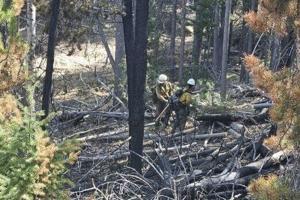SAN FRANCISCO (KGO) -- The Trump administration is proposing to cut roughly a third of the federal health budget -- which would mean eliminating dozens of programs and shrinking health agencies. The effects could ricochet through huge institutions like UCLA, Stanford and UCSF, putting pressure on the Bay Area economy. While few institutions are reacting publicly, three top researchers are speaking out on their own about the tremendous stakes.
The massive research and hospital system known as UCSF dominates the San Francisco skyline from Mt. Sutro to the shores of Mission Bay. But, its impact on the city and the country runs much deeper.

The system is the largest public recipient of federal funding from the National Institutes of Health in the nation. MORE: Trump administration freezes billions in funding to Harvard University after rejecting demands UCSF received more than $800 million in 2024. And the breakthroughs that money has paid for have changed medicine.
Breast cancer researcher Dr. Laura Esserman, M.D.
, runs one of the most advanced platform trial networks in the country, testing emerging breast cancer drugs to personalize treatment "We went from having 19% of women have their tumors go away to now 60%. Our goal is to get to 90%. Dismantling all of this work is not going to get us there," Esserman said.
She's talking about the future of hundreds of millions of dollars in cuts or proposed cuts from the National Institutes of Health and Health and Human Services. It's a concern echoed at universities and medical research centers across the country. The running list of targeted or terminated grants already falls heavily in California in funding lost: UCLA almost $110 million, Stanford nearly $30 million and UCSF $23 million, according to an ABC News analysis of data released by the new Department of Government Efficiency, or DOGE.
MORE: Layoffs begin at US health agencies responsible for research, tracking disease and regulating food Some in the Bay Area worry about a lingering distrust between the administration and the scientific community dating from policy disagreements during the COVID crisis and beyond. UCSF emeritus professor Paul Volberding, M.D.
, was in the front lines during the politically fraught AIDS epidemic. He now worries about the search for new cures for diseases across the spectrum. "It's hurting a lot of people.
It's hurting the people that are doing the research. It's hurting the people that are volunteering to be part of the research. And it's hurting all the people that are waiting on the results of the research for the advances," he said.
The search for those cures is woven into the Bay Area's economy, with more than a quarter million jobs in biotech and related sectors. They are fueled in hubs like UCSF's sprawling campus at Mission Bay in San Francisco. That's where Regis Kelly, Ph.
D., helped launch QB3. It's a biotech incubator that's turned breakthroughs generated by UC researchers into thriving biotech companies, following in the footsteps of famous startups like Genentech and Chiron.
"We've been pretty successful. We calculate we've made several thousand jobs we've created in the companies we've started, and the companies we've helped spin out. We think we've brought in billions in income," Kelly said.
Everyone we're profiling agreed to talk to us with a single goal: to drive home the life-changing breakthroughs that come through UCSF and other research centers, and recognizing the immense value they create. MORE: Trump administration cancels $400 million worth of grants and contracts to Columbia University UCSF is currently the second largest in employer in San Francisco after the city itself. It's estimated that every dollar in federal funding creates more than double that amount in economic activity.
Esserman also points to payback on the dollar. She and her colleagues at UCSF helped pioneer the use of multigene testing to help fast track the testing of potential cancer drugs in patients with high-risk early stage disease when they are first undergoing treatment as well as those who are curable, using MRI to rapidly assess and measure response and direct next steps in their care. The team uses the same approach to personalize breast cancer screening and prevention by starting with risk assessment, which includes genetic testing to determine when to start, when to stop, how frequently to screen and with what imaging tool and when to consider prevention.
"That's a huge driver of cost. These investments and these studies, this is, you know, a $10 or $20 million study that will save $20 billion in screening. Do you understand the investment? It's like a 1,000-fold return on investment.
We should not let these things go away. These are the things we should be investing in," she said. MORE: HHS cuts 10,000 employees in major overhaul of health agencies "We don't seem to learn our lesson.
Public health is really important. It has to be done seriously. It has to be done on a national level.
We have to have good databases so we know who is getting what new diseases. And we've let that fall apart, time and again. And it's happening again today, as the federal government is attacking the public health system," Volberding said.
"I can't believe it," said Regis Kelly. "I think I'm having a nightmare. And I'm going to wake up sometime, and I say, 'Oh, it was just a bad dream.
'" While it's hard to know if the cuts outlined in the first 100 days of the administration reflect a new reality for medical research, the pace so far is sobering. A spreadsheet on the Health and Human Services website lists the cancellation of federal grants. The printed document, in tiny font, now runs some 50 pages.
And some already see it as a referendum on science, medicine and where our health care system may be heading in the future. "People need to stop and think about it," Esserman said. "Is that what they want to return to? They want to return to a time in early 1900s when child mortality was so high? I think people need to take a step back and say, 'What has science brought us?'".
Health

Federal cuts by Trump administration could ricochet through Bay Area research hubs, experts say

The Trump administration is proposing to cut roughly a third of the federal health budget -- which would mean eliminating dozens of programs and shrinking health agencies. The effects could ricochet through huge institutions like UCLA, Stanford and UCSF, putting pressure on the Bay Area economy.















